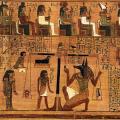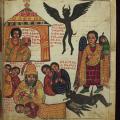7. Richard Parkinson on Egyptian Poetry
Egyptologist Richard Parkinson joins us to talk about the context and meaning of the Eloquent Peasant and other literary works of ancient Egypt.
Themes:
• R.B. Parkinson, Voices from Ancient Egypt: An Anthology of Middle Kingdom Writings (London: 1991).
• R.B. Parkinson (ed.) The Tale of the Eloquent Peasant (Oxford: 1991).
• R.B. Parkinson, “Literary Form and the Tale of the Eloquent Peasant,” The Journal of Egyptian Archaeology 78 (1992), 163-78.
• R.B. Parkinson, The Tale of Sinuhe and Other Ancient Egyptian Poems: 1940-1640 BC (Oxford: 1997).
• R.B. Parkinson, Poetry and Culture in Middle Kingdom Egypt: A Dark Side to Perfection (London: 2002).
• R.B. Parkinson, The Painted Tomb-Chapel of Nebamun (London: 2008).
• R.B. Parkinson, Reading Ancient Egyptian Poetry: Among Other Histories (Chichester: 2009).
• R.B. Parkinson, Hunefer and His Book of the Dead (London: 2010).
• R.B. Parkinson, The Tale of the Eloquent Peasant: A Reader’s Commentary (Hamburg: 2012).
• R.B. Parkinson, A Little Gay History: Desire and Diversity across the World (London: 2013).
Blog post: Giving a Voice to Ancient Egyptian Poetry
Podcast with Barbara Ewing: “The Life of Sinuhe”







Comments
Timeless human questions
I first started studying philosophy during my struggles with depression and addiction. As an agnostic who often struggles to feel any hope, I needed something other than late capitalism's relentless focus on preference satisfaction, its hunt for prestige and economic success. I needed a reason to keep choosing to work on this absurd, painful and wonderful issue that being a human is. I found something in Aristotle that kept me going. Who knew that a long dead Greek misogynistic genius biology nerd (who also, to be fair, only bloody invented logic) would give me an ethical theory that inspired me to keep going? Reading The Dispute between a man and his Ba is likewise a strange comfort. To know that 4000 years ago, someone probed the same questions and battled the same feelings. "Death is in my sight today, like a man's longing to see home after he has spent many years in captivity." This is breathtaking. Sure, it doesn't bring me the systematic positive structure of the Nicomachean Ethics, but it does something equally important; someone has taken great care to bend language into an outlet for thoughts that can barely be expressed in our everyday sedimented language, the true drive of poetry, to think the unthinkable and say the unsayable. And like the Epic of Gilgamesh, it also makes me grateful in moments of difficulty that I live in a time where I can just walk into a library and read translations of these echoes from millennia ago, where poets and philosophers wrestled with the absurdity of life and loss and the inevitability of death. Then modern academics have spent years of great care and intellectual struggle to decipher these thoughts for us, the readers. That is truly something to be grateful for.
Thank you Peter for bringing The Dispute between a man and his Ba to this list of healing, I was unaware of it before your podcast. You are really adding something wonderful to the world, with no paywall. It means something. And I look forward to reading Parkinson!
In reply to Timeless human questions by Jonathan Jonsson
A Man and His Ba
Thanks for this wonderful response! I agree, it is a brilliant text. (Since doing the podcast I also taught it to a class here in Munich and it generated a very interesting discussion.) By the way for these Africana philosophy episodes half the credit should go to my co-author Chike Jeffers!
Add new comment